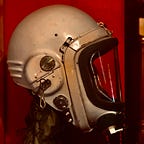What is science fiction?
It’s more than just a marketing label
Every time one attends a science fiction convention — one of the ‘serious’ literary ones — there’s inevitably a discussion on genre. What are the boundaries of rockets and jetpacks? What definitively locks in a story as science fiction over fantasy?
At these talks, it’s discounted as something put into place by booksellers to arrange books by similar tropes, to help direct funnel people towards the right shelves. That’s true; working at a bookstore, there’s the business need to put as many books into people’s hands. But after reading up on a lot of SF history, I’m less convinced that most authors write within strict guidelines so that they’re placed on the right bookshelf.
For one thing, science fiction and fantasy stories, as distinct genres, predates the entire book publishing industry by a good quarter century, and with roots that extend even further beyond that.
There’s a handy marker for the first way point for SF literature: Mary Shelley’s Frankenstein. Like Frankenstein’s monster, it was brought abruptly to life alongside the Industrial Revolution, and serves as a good metaphorical look for the argument between ethics and logical science. Shelley has her followers, although it’s less of a direct line: Edgar Allan Poe of America, Jules Verne, of France, and H.G. Wells of England, each of which explored the connective tissue between modern technology and society in their own way. Poe looked at people in strange situations. Verne celebrated the boom of technological advancement, while Wells saw the past repeating itself, just with newer gadgets to help out. These individuals set the stage.
Science Fiction as a distinct genre isn't named until 1929, when Hugo Gernsback launched his first ‘scientifiction’ magazine, Amazing Stories, which pulled in a variety of reprints from Poe, Wells and Verne, as well as new, exciting and terribly written works from other authors. Speculative and science stories weren't anything new at this point; magazines like Argosy and Weird Tales had been around for years before, publishing their own brand of pseudo-science stories. Even Gernsback had published SF earlier. The common link between each is an optimistic outlook on what technology could do for society at large: it could bring us to incredible distances, cure diseases and solve all of our problems. If one ignores some of the underlying assumptions about a modern society, such as expansionism, racism and class-ism, the genre appears to have been a road map for the future. Handicaps or no, early science fiction grew in a time of incredible technological advancement: few people could accurately imagine what would happen.
Real world events prove to be a somber reminder that not all technological advancements are the boon they’re made out to be. The First World War showed the devastating affects of industrialized warfare, while the Manhattan Project demonstrated even greater horrors and achievements that could be obtained through science and technology.
Science Fiction has adapted, so it’s not technological optimism that’s the driving point. Rather, it seems to be a dialogue of co-existence, one that’s heavily dependant upon surrounding events, trends and changes. It swings back and forth between optimistic and terrified, all the while examining the people who have to deal with rayguns to cell phones. It’s the technological implications upon the people who create it where science fiction is at its best, looking at technologies not necessarily accurate, but at human reactions that are all too real.
It’s not the bookstores that define the genre, but the ways in which bookstores exist that ultimately make the definition. Plus, rockets and ray guns.
